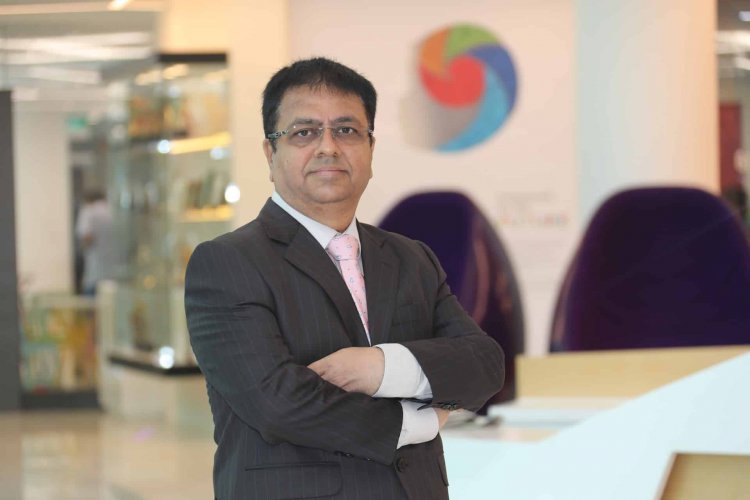Atul, in terms of running a successful education network, you are considered as one of the region’s seasoned individuals. Tell us about yourself.
Before moving into the education sector and setting up the Global Schools Foundation, I worked in the corporate sector where I held roles in technology companies – IBM and HCL technologies. It was during my time at these companies that I started to observe how technology was changing the way businesses function. Businesses were racing to adopt newer and innovative technologies – they were finding new ways of embracing technology-based solutions to stay ahead of their competition. In fact, it was one of the things that opened my eyes to the pressing need to prepare younger generations to be part of the digital revolution that is unfolding before us so that they are better equipped to deal with the future.
That was how Global Schools Foundation was set up. It was an idea to provide students with a holistic educational framework by adopting best industry frameworks and practises alongside technology that will drive the necessary change as well as bring value to society. Education has a special place in my heart and keeping it relevant for students is what motivates me to do better. Therefore, as chairman and co-founder of GSF, I ensure we continue to adopt newer practices, methodologies and the latest infrastructure to best benefit our students, nurturing them into global citizens.
In Singapore, you are best known for your flagship, Global Indian International School. You set up this school with one thing in mind – the children of global employees can move to different countries seamlessly with minimal disruption to their education. Can you walk us through how the idea first came about and the processes that followed?
Back in 2002, we saw a need for an international school which provides a great foundation to cultivate and nurture young minds for the future digital economy. Parents look for educational institutions offering high standards of education – they want learning opportunities that open doors to reputed tertiary educational institutions whether it’s in their home country or abroad. Relocation, whilst it does open doors, can be a stressful process for both parents and students.
Living abroad and sending children to an international school can be confusing and expensive. Many parents seek reassurance in terms of the quality and continuity of education, and they also look for affordability. At GIIS, we took into account these considerations by providing parents and students with a premium quality international education institute at an affordable price. Our admission programme provides students with a smooth transition as they move from one country to another.
Some examples include the implementation of flexible admission periods, consistent teaching and learning standards across all campuses, and the provision of multiple curricula (IBDP, IGCSE, IB PYP, CLSP, CBSE) to be able to meet each student’s needs. The option of multiple curricula allows students moving from India or any other countries to have a smooth transition with minimal disruption to their education.
Very excited to know about your SMART Campus in Singapore. Share that with us, please.
The SMART Campus caters to the learning needs of young “digital natives” and equipping them with the skills required for the 21st-century workplace and becoming NextGen leaders. Every classroom on the campus combines world-class infrastructure with advanced technology to facilitate critical thinking, collaboration, communication and creativity among students.
Some of the key features of the SMART Campus include 92 SMART classrooms equipped with 180 interactive touch-screen displays to stream videos, display student work, and act as SMART boards; 50 flipped classrooms that encourage discussion, brainstorming and collaborative learning with students of other neighbouring classrooms; and student and teacher iPads preloaded with authorised education applications that facilitate a more collaborative digital learning experience.
Our aim of incorporating these features into the classrooms is to provide students with the right tools they need for interaction, collaboration and communication with experts around the world. We want them to be creative and innovative in their approach to learning.
Give us your thoughts on the ever-evolving education field, Atul; the opportunities and challenges.
The education field is evolving. Education has transformed from just providing information to students into teaching them how to implement what they learn into real-life scenarios. In the past, education focused on subjects taught such as Mathematics, Science or English but now we are slowly pivoting towards crafting out an individualised and customised approach to learning. Today, we are starting to see educational boards and institutions focus on improving learning outcomes and cognitive development within their curriculums.
Students today are digital natives – we should be leveraging their digital savviness when it comes to formulating learning plans. New methodologies can be formed to reach them through digital media. They are curious – we should be picking up on their personalities, their interests and needs to find new ways of educating them. For instance, lessons should be short, concise, interesting and engaging where teachers act as guides, mentors and consultants to assist students in their everyday problems.
The new outlook of teaching would be to impart life skills including creativity, problem-solving, critical thinking and teamwork. Schools need to quickly adopt experiential learning methods that include these skills into their daily curriculum to keep up with the quickly digitalising economy.
You have expanded GSF across seven countries – Singapore, Malaysia, Japan, Vietnam, UAE, Thailand and India. Why these locations and do you have plans to expand elsewhere?
Our vision has always been to become the most innovative schools in the world with the largest number of SMART Campuses consisting of 200 Smart classrooms. To achieve this, we are expanding our footprint in the world. We are opening campuses in Tokyo, and 3 more SMART Campuses in India in the cities of Balewadi, Hadapsar and Bannerghatta in 2019 and over the next three years in Amaravati and Nagpur. On the whole, what we do want to provide is the best, 21st-century education and learning environment to as many students as possible. We will continue to explore new locations to build SMART Campuses for the benefit of all students around the world. We are embodying the global in our name by offering a consistent quality offering across key markets. Students deserve the highest quality of education and geography shouldn’t impede this.
Atul, the education sector is most probably one of the most dynamic in terms of evolvement. How do you ensure you continuously establish new standards; the innovation and strategic adoption of technology, amongst others?
We are constantly thinking of ways to better the educational outcomes of our student community. Currently, our flagship SMART Campus in Singapore is one of Asia’s largest school campus built on 3,000 sqm gross floor area with 92 SMART classrooms. We offer a pedagogy which is a unique blend of traditional academia and 21st-century skills requirements and we want to ensure our pedagogy evolves with the needs of the 21st century. We are continuously enhancing our school’s technological infrastructure to provide students and educators with better learning experiences.
For instance, we have just completed testing of more sophisticated technology to be used in sports, also known as SPEDAS – Sports Performance Enhancing Data Analytics System. Through this technology, the on-field performance of players will be captured through wearable digital technology and stored on servers. The system maps player’s location, movement, collects and stores data and allows analytics engine to study the player’s performance in great detail. With this, game playbacks will present a detailed analysis to assist coaches in improving player performances and form better strategies for improved team matches.
We also actively work with students to understand and provide them with the guidance, knowledge and skills they need to realise their potential through our specially-curated 9GEMSTM framework. The framework is carefully weaved into the GIIS SMART Campus ecosystem to enhance the learning experiences of the students by balancing academia with extracurricular activities and universal values to shape our students into well-rounded and responsible citizens of the future.
In addition, just as how we encourage students to never stop learning, part of my goal is to continuously learn and come up with new ways we can provide them with the quality education they need to become leaders of tomorrow.
What have your marketing strategies been?
For us, the satisfaction of our parent community is foremost in our mind. GIIS provides premium quality education at a moderate fee, which is a big draw for expats who are looking to give the best to their children at reasonable fees.
Within this context, all our marketing strategies have been designed to give more and more benefits to our existing and prospective parent community through their school-going children. We have both Indian and International curricula to meet the needs of various sections of the community. We provide Bridging Programmes for students who join mid-year, and we have Referral programmes where parents can refer us to their community circles.
Besides this, we emphasise on our wide-range of curricula for K-12. From Global Montessori Plus at the Kindergarten level to IB, IGCSE at primary, middle school and secondary levels, we have complete international curricula besides the Indian CBSE curriculum, which provides options to students who wish to switch. Our marketing strategy is thus confined to informing the parent community what we have in store and how it will improve their child’s chances to excel in the future.
Marketing or branding, Atul – and why?
For any institution, the Brand represents its vision, mission, its core values and its aspirations. For us, GIIS is a brand that is synonymous with good quality education at a moderate price – which means we believe in giving the best holistic education to our students to make them global citizens of the future. Through initiatives like Leadership Lecture Series, Real World Challenges Conference, Jhankaar, Global Indian Stars etc. we have given students a platform to showcase their talents and excel on a world stage. This has built our brand as a strong advocate of all-round student development. Marketing is only one aspect of such brand building, but what the parent community associates with the Brand – our pedagogy, our efforts, our quality education – is what speaks for itself in the long run.
Where can we read all we need to know about Global School Foundation?
More information on GSF can be found here
For those who wish to be in touch with you, how can they do so?
Check out our website.
















